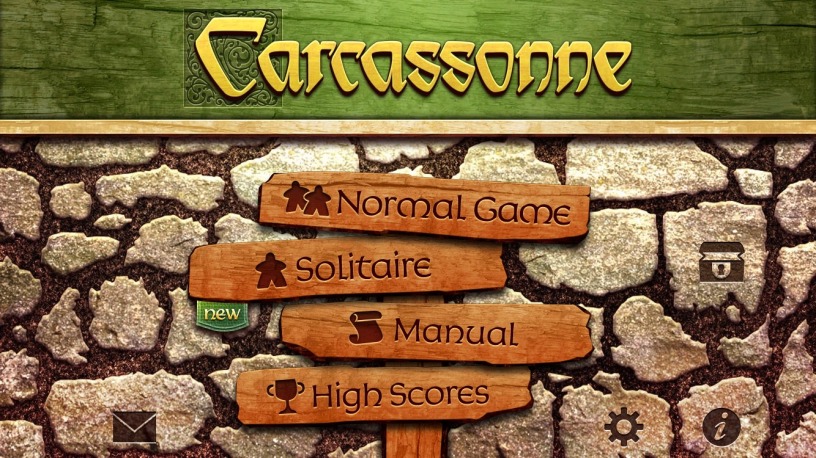Type: Tile Placement / Euro
Time to play: 45-60 minutes (Teaching: 10 minutes)
Best played with: 3 Player (2 – 5 Players)
So it’s rare for me to include a game here predominantly off of app plays – I have played the board game of Carcassonne, but like many classic games that was some time ago. I recently picked up the app version for the iPhone though and after a few hundred plays I thought it was time to add this to review board.
So why is it that I keep coming back to this neat little game. Firstly, it’s the king of a genre – tile laying. Carcassonne is the first game many think of with this mechanic (heck it’s the first board game many people think of when you say “board game”). The game takes a simple mechanic, a small number of rules and makes a complex euro (scoring) game.
Each tile has different pictures – combining roads, castles, monasteries and fields to create a very different board each game. Each player takes a turn to pull a tile out and place it. The random tile could reveal any combination of the above and you will have the choice of where to play it and whether to put a meeple on it. Fun fact – the term meeple was coined in relation to the pieces in Carcassonne!
You could place your meeple on the road, in a castle, in the monastery or in the field – becoming a different role in medieval history and scoring points via a different method. Be careful though because you only have a small number of meeples to put out and until they complete their scoring condition you cannot get them back.
In fact, that’s where this peaceful little game takes a nasty turn – that road you were building with a meeple on it – can now not be finished due to the tiles placed by others around it. That castle you started, has now been overrun by another player through careful plays. Of course there are ways to mitigate or block this but that’s going to come down to who gets what tiles, when. A run of pointless straight roads might lead you off to nowhere, especially if you don’t have a road meeple out that can benefit. You can block others, but expect that every good deed will not go unpunished.
The emergent game play here is immense; each board builds out from the simple starting tile and often varies materially. Sometimes, the castle builders will keep things small and leave lots of points for the farmers (from completed castles), but sometimes they will end up racing to build a giant castle crossing the map and scoring lots for those mad enough to occupy it, but little for anyone else!
Also, it’s a relatively quick game. Playable in an hour plus a very short teach. However, this game has more to it than that and you can certainly put it alongside chess for all the time it may take you to master – especially if you start to add on expansions. Side note; one expansion actually has castles and the things I refer to are towns, this is annoying but I can’t escape this bit of tautology when I think about the game and if you see the tiles you will understand why.
Okay, so if you can’t stand drawing tiles at blind and then being forced to find the best thing to do with them, this isn’t for you. However, if you like the mix of building out a map with cornering your opponents and cleverly taking over their fields / castles (towns!), then there is lots to love here. On the app, you can get this game down to 10-20 minutes, and that’s just perfect for a commute on the tube.
Last notes;
- If you like classic games that defined a genre – you will enjoy this base game with plenty to develop out of the simple rules set
- If you hate random drawing of tiles every turn, and the possibility of getting all your pieces trapped on the board – watch out for the learning curve here
- If you win, try again and see what people do differently!
